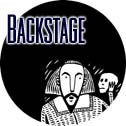
Comment
on this story
What:
Brilliant Traces by Cindy Lou Johnson, directed by Zack Allen
When:
Thursday, Friday, Saturday, 8 p.m. thru Feb. 28
Where:
The Actors Co-op's Black Box Theatre
Cost:
$5 Thursdays, $12 general, $10 students/seniors. Call 909-9300 for reservations.
|
|

Brilliant Traces suggests pain can be its own worst enemy
by Leslie Wylie
In the third world country of love, we all start out as tourists from Switzerland. Romance looks like Disneyland through rose-colored Polaroid lenses, but it only takes a landmine or two to ignite the heart's defensive. We quickly learn to watch our step, choose our words a little more carefully, and keep our pockets stocked with soul-sized band-aids.
Rosannah Deluce and Henry Harry, co-stars in the Actors Co-op's production of Brilliant Traces, decide to burn their passports altogether. Defeated by the anguish of having loved and lost, they respectively come to the conclusion that it is better to have never loved at all. When it comes to vulnerability, they quit; however, the flags they wave at the world are two different shades of white.
In matters of fight or flight, Rosannah (Jenny Ballard) opts to bolt. The bride-to-be literally backs out of her own wedding, gets in her car and drives straight from Arizona to rural Alaska in a blind state of hysteria. After her car breaks down in a blizzard, she finds herself on the doorstep of Henry (Buddy Lucas), a hermit convinced that hiding is the only sure means of evading heartache.
In an act of empathy spiked with bitterness, Henry takes the woman into his home and begrudgingly resolves to provide her with food and shelter until the storm lets up. This seemingly simple act of humanity initiates a stilted, intermittently humorous, waltz between two characters desperate for emotional connection but bent upon keeping their hearts encased in emotion-free zones.
Cindy Lou Johnson's script is the kind of solid, brave creation that could stand itself up at the end of the show and take a bow. But for the two actors dealing with the two-person script, the challenge of swallowing half of a play each and then staying afloat amidst the characters' schizophrenic emotional sea changes predisposes them to collapse.
Throughout the play, precarious ratios of combativeness and compassion are constantly shifting, and often times the disconnected characters can't even look to each other for the score. This is particularly true for the first half, when Rosannah and Henry spend more time talking to themselves in loosely jointed monologues than talking to each other. When the emotional transactions do start going through, the speed and volume with which the characters lower their defenses is critical: too fast or too slow and the tension evaporates; too dramatic or too subdued and the characters dissolve into over-affected sociopaths. Lastly, since Traces is a play about love that involves one man and one woman, there's the question of how to distract the audience from prematurely sniffing around for romantic attraction.
All things considered, the cast and its captain, director Zack Allen, run a pretty tight ship. Their abilities to blur the past and present could rival those of a professional acid tripper, and they manage to alienate their characters from the world without alienating their audience. Between Ballard's manic digressions and Lucas's wrenched detachment, the two may have the corner on dysfunctional pathos, but they leave enough room for our hope that they'll have a lemonade stand set up on it by the end of the play.
With all of that mess working itself out on stage, there isn't room for a whole lot else. Allen's set design is simple but authentic in its furnishings of the contemporary Alaskan bachelor pad: a stove, a mattress, some books, a teapot and a bottle of whisky. The Nick Drake-imbued soundscape is also satisfyingly desolate (although the jarring musical interludes could be softened by somebody at the soundboard fading them in and out), and props to whoever knew that no discography of solitude is complete without Wilco's "How to Fight Loneliness."
Also of note is Allen's decision to splice the play, which was originally conceived to run in a single act, into two halves. In the director's notes, he explains that the alteration was an attempt "to emphasize the feeling of time compression, as well as accentuate some of the playwright's more metaphysical and allegorical ideas." Whether allowing a play to take a breath in the middle of itself counts as compression or not, it did give the audience a brief escape from the play's intensity. Of course, whether the time was used to ponder metaphysical ideas or smoke cigarettes is also questionable.
To splice or not to splice. Decisions like that, hey, what are they going to matter 10 or 20 years from now? To love or not to love.... Now, there's one worth wracking your heart over. Brilliant Traces says: Don't settle for postcards. Love can be a battlefield, but it can also be a beach. Get out there, and remember that while a little sun block never hurts, the worst burns usually fade into really great tans.

February 12, 2004 • Vol. 14, No. 7
© 2004 Metro Pulse
|